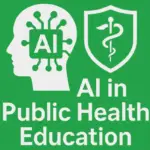
Introduction
Artificial Intelligence (AI) is rapidly transforming public health—from predicting disease outbreaks to improving health communication and streamlining policy decisions. Yet, as AI tools become more embedded in health systems, a crucial question arises: are public health professionals prepared to engage with these technologies responsibly and effectively?
The answer lies in a growing imperative: AI literacy.
Understanding AI Literacy in Public Health
AI literacy refers to the ability to critically understand, evaluate, and apply AI tools within a public health context. It doesn’t require every professional to become a data scientist but does demand a foundational grasp of how AI systems work, their potential benefits, and their limitations.
For instance, a public health practitioner with AI literacy can assess whether an AI-driven predictive model is appropriate for a specific population, recognize potential biases in the data, and make informed decisions about integrating AI tools into health interventions.
Why AI Literacy Matters Now
AI is already influencing public health in significant ways. Predictive analytics are used to forecast disease trends, natural language processing aids in analyzing health records, and AI-driven tools assist in identifying at-risk populations. However, without proper understanding, these tools can be misapplied, leading to ineffective or even harmful outcomes.
Moreover, AI systems can inadvertently perpetuate existing health disparities. A 2025 study published in Nature Medicine revealed that AI models used in healthcare may recommend different treatments for the same clinical scenario based on patients’ socioeconomic and demographic profiles—essentially mirroring and reinforcing real-world inequities. For instance, higher-income patients were more often recommended advanced imaging tests, while lower-income individuals were more frequently advised to undergo no further testing (Reuters summary).
This underscores the necessity of AI literacy: public health professionals must be equipped to detect, question, and address these embedded biases in digital tools.
Integrating AI Literacy into Public Health Education
Despite AI’s growing relevance, many public health curricula lack comprehensive AI training. Some institutions are beginning to address this gap. For example, the University of Michigan’s School of Public Health now offers courses that explore the intersection of AI and public health, helping students develop critical thinking around digital tools and data-driven decision-making (UMich SPH).
To better prepare the next generation of practitioners, schools of public health should integrate AI literacy into core curricula. This includes interdisciplinary programs, collaborations with computer science departments, and practical case studies where students can evaluate AI tools within real-world public health contexts.
The Role of Policymakers and Institutions
Advancing AI literacy extends beyond academia. Policymakers and health institutions must prioritize funding for AI education, create ethical guidelines for technology use in public health, and support public-private collaborations to ensure shared learning and responsible innovation.
Creating a policy environment that encourages ethical AI adoption while maintaining transparency and accountability is crucial for building public trust and achieving equitable outcomes.
A Call to Action
The integration of AI into public health presents both opportunities and challenges. To harness AI’s full potential while safeguarding public health values, a concerted effort to enhance AI literacy is imperative. Public health professionals, educators, policymakers, and institutions must work together to ensure that AI technologies are applied ethically, equitably, and effectively.
This blog post was human-authored with assistance from AI to improve clarity.
Keywords: AI Literacy, public health schools, AI in epidemiology, predictive analytics in health, public health education, AI ethics, health data bias
